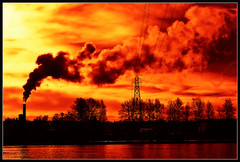Like a sugar addict does on Halloween, our federal government is trying to grab everything in sight for itself. This illegitimate acquisition of power demonstrates itself in nearly every executive order, Czarian mandate, and congressional bill; very little of what comes from Washington these days passes Constitutional muster. The latest of a steady stream of attacks on individual liberty and the free market comes in the form of "Cap and Trade"—a federal limit on carbon emissions and creation of a credit-based system through which companies may acquire or sell extra privileges to pollute.
The nickname "cap and trade" came about because this legislation would put a limit ("cap") on the carbon emissions each company could produce, as well as allow companies to buy or sell ("trade") extra credits to other companies. It is especially ironic that this nickname describes the destructive effect the law would have: the imposition of government limits on carbon emissions would effectively cap trade itself (trade being a synonym for economic exchange). Think of it this way: if the government were to cap dollars themselves (we can all fantasize, can’t we?), there would be less money production, which would mean less money circulation, which would mean less ability to exchange dollars for goods, which would mean less demand for goods, which would mean less production of goods, etc. The artificial barrier imposed on a productive enterprise by government—even those with supposedly noble intentions—discourages investment, production, and consumption. In an economy stuck in a quicksand pit, one would think that this would be the last thing our government would try and foist upon us.
A recent Wall Street Journal article elaborates on this intervention cycle, showing that the Democrats trying to ram the 1,500 page bill through Congress have little concern for the impact on Americans’ wallets and overall effects on the economy:
The whole point of cap and trade is to hike the price of electricity and gas so that Americans will use less. These higher prices will show up not just in electricity bills or at the gas station but in every manufactured good, from food to cars. Consumers will cut back on spending, which in turn will cut back on production, which results in fewer jobs created or higher unemployment. Some companies will instead move their operations overseas, with the same result.
…
Even as Democrats have promised that this cap-and-trade legislation won’t pinch wallets, behind the scenes they’ve acknowledged the energy price tsunami that is coming. During the brief few days in which the bill was debated in the House Energy Committee, Republicans offered three amendments: one to suspend the program if gas hit $5 a gallon; one to suspend the program if electricity prices rose 10% over 2009; and one to suspend the program if unemployment rates hit 15%. Democrats defeated all of them.
If you thought the trade deficit and off-shoring were issues before, just wait until the Democrat-sponsored draconian global warming clampdown takes hold. The citation above made mention of moving operations overseas to locations not restricted by carbon emission limitations, and that’s an obvious likelihood. But in an effort to save face and placate well-connected lobbyists and voting blocs, Congress will soon find itself having to intervene even further to try and soften the blow a little:
Knowing that the costs associated with cap and trade will send hard-pressed U.S. consumers and producers to lower-priced imports, some legislators seem keen on trade barriers as the easy solution–thereby raising the costs of foreign products and making them less competitive in the U.S. marketplace. For these legislators, the potential risks of global warming trump all other policy concerns, including the long-term prosperity of Americans. From their point of view, if protectionism in U.S. cap and trade becomes the standard for other countries to follow–or ignites a trade war with countries refusing to trade economic growth for curbs on emissions–all the better.
Once again we have interventionism on display, with few realizing what they’re seeing. As in war where we rebuild the bridges we blow up, so too in the economy do our power-lusting politicians aim to fix the problems they themselves have created. Few dare to point out that the whole chain of events would be eliminated were we to reverse the root problem. Instead, this politically unacceptable self-restraint has long been cast aside for the "we-can-do-anything-we-please" style of governance. The double dose of intervention (cap and trade, and then protectionist trade barriers) is but the continuance of a long cycle of economic interventionism—albeit a massive one.
Cap and trade will (if passed, possibly even this afternoon) do great damage to our economy, shrinking our GDP and stifling incentives to produce, invest, and manufacture domestic goods. Our dependency upon cheap products created by countries not restricted by such global-warming-inspired lunacy will increase, thereby forcing us to rely further on countries who certainly do not have our best interests in mind. If we truly wish to improve the economy, cap and trade should be strongly rejected. The alternative is a very real cap on American trade, and an onerous restraint on the peaceful, productive pursuits of far-from-free Congressional guinea pigs (formerly referred to as Americans).
***************
Related Posts (automatically generated)
Continue reading at the original source →




